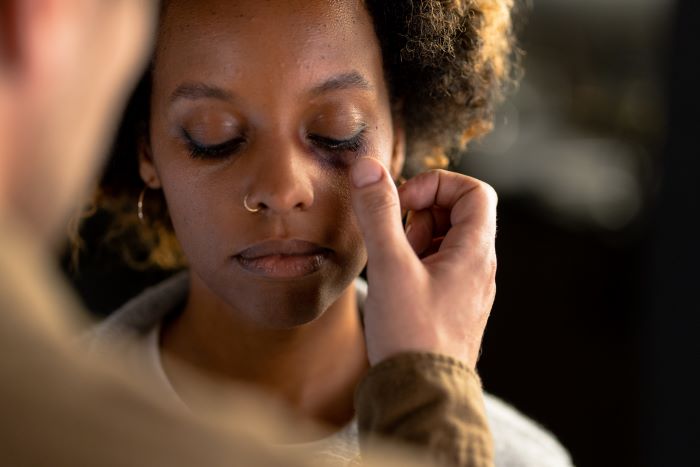Placing Blame in Relationships: A Persistent Problem
By the time most couples seek therapy, we imagine the conflict has been brewing for one partner for a while. Rarely is it their first disagreement, and blame-based patterns have emerged. Partners often come to therapy feeling that the other person is to blame for all the problems in their relationship. Let’s take a moment to look at the couple Jenna and Henry as an example of placing blame on marriage and attempting to explore their story in more depth to see what can happen.

Blaming and Emotional Consequences: The Impact on Jenna and Henry
Jenna believes Henry is inconsiderate and uncaring and avoids taking responsibility, while Henry thinks Jenna is overly critical and always needs to be right. In this scenario, blaming the couple, focusing on the fault, and placing blame often leads the victim to emotional distress and feelings of defensiveness, anger, and hurt. For instance, when Jenna blames Henry for being late to a dinner party, Henry feels criticized and blamed and becomes defensive, further blaming and fueling their argument without anything to explain.

The Role of a Schema Couples Therapist: A Guiding Light
A couples therapist is not there to fix one partner of behavior or surgically remove partner-diagnosed problems. Instead, the therapist’s role is to listen and help both partners understand the underlying issues, behaviors, and emotions driving their conflicts. They serve as a translator, helping essential parts of the couple uncover the real-life issues behind their arguments and communicate effectively.
Understanding the Core Issues: Jenna and Henry’s Schemas
Schema-trained therapists look for schemas and worldviews developed in childhood that may no longer be accurate. Both partners bring many things, these schemas or skewed life perspectives, into the relationship. It is the therapist’s job to identify and deal with them and help each person in the couple understand the impact of their conflicts on relationships.
Jenna’s Abandonment/Instability Schema: A Source of Fear
Jenna grew up in a volatile environment, leading her to develop a strong Abandonment/Instability schema. This schema and behavior are triggered by anything to feel wrong about happening that looks like instability or a lack of care, causing her to act out to feel upset and fearful. For example, when Henry forgets to call and says he’ll be late, Jenna’s schema triggers lead her to act out to feel abandoned, afraid, and hurt.
Henry’s Defectiveness/Shame Schema: A Burden to Bear
On the other hand, Henry grew up in a family that valued high achievement and punished or ignored him if he did not meet their expectations. This led to a Defectiveness/Shame schema, causing most people around him to feel unworthy and acting as if he is never good enough. When Jenna criticizes him for not talking or doing things the way she wants, Henry’s schema is activated, making the person around him feel defensive and acting even more inadequate.
Breaking the Cycle: Creating a New Path for Jenna and Henry
Understanding these schemas and their impact on the emotional abuse of children and the couple and children’s interactions can help break the cycle of consistently placing blame in your marriage, take responsibility, and foster open communication. When Jenna and Henry understand each other and their children’s schemas and how they influence and control their behavior, they can work on resolving their issues, taking responsibility for their actions, and supporting each other and their children’s emotional needs.

Strategies for Overcoming the Blame Game: Tools for Success
- Practice open communication by listening and responding empathetically with an open mind. For example, when Jenna expresses her emotions related to abandonment, Henry can respond with understanding and reassurance rather than getting defensive.
- Avoid blaming or pointing fingers; focus on your feelings and emotions and admit when you are struggling. Jenna and Henry can share their feelings instead of blaming using “I” statements, such as “I feel hurt when you don’t call” or “I feel inadequate when you criticize me.” Neither partner needs to lose or feel blamed. They can both apologize and feel heard.
- Accept that both partners contribute to the relationship’s issues and work together to address them. Jenna and Henry can acknowledge that their schemas play a role in their conflicts and commit to working on them together.
- Develop self-esteem and self-worth by acknowledging and valuing each other’s perspectives and experiences while taking responsibility for times when hurt happened. Jenna and Henry can practice expressing gratitude and appreciation for one another’s unique qualities and contributions to the relationship.
- Practice honesty and vulnerability by sharing your fears, insecurities, and emotions with your partner. When Jenna and Henry open up about their schemas and the feelings behind them, they create a stronger bond and a deeper understanding of each other’s needs.

The Importance of Self-Reflection in Breaking the Blame Game
Another crucial aspect of overcoming the blame game in relationships is practicing self-reflection and taking responsibility. Examining your behavior, thoughts, and feelings can provide valuable insights into your contribution to the relationship’s conflicts and avoid blaming your partner for fault. In addition, self-reflection enables you to recognize any personal triggers, unresolved issues, behaviors, or patterns that may fuel the blame game, allowing you to address them proactively.
For instance, Jenna might realize that her Abandonment/Instability schema triggers her to react defensively when Henry forgets to call her when he’s running late. However, upon a moment of honest reflection, Jenna can see that her reaction stems from her past experiences rather than Henry’s genuine sense of fault or lack of care. With this understanding and perspective, she can address her schema and respond more calmly in similar situations.
Similarly, Henry might discover that his Defectiveness/Shame schema causes the woman around him to feel bad and overly criticized or, worse, blamed when Jenna expresses her feelings — part of blaming their partner. By recognizing this pattern, he can learn to separate his feelings of fault and shame from Jenna’s honest comments and build his self-esteem to better handle constructive feedback from the woman and partner.
Support from Loved Ones and Friends
While couples therapy is essential in overcoming the blame game, it’s also important to remember the role that loved ones and friends can play in supporting a couple’s journey. Encouraging open conversations, offering a listening ear, and providing non-judgmental guidance can make a difference in helping couples navigate their challenges. By surrounding themselves with a supportive network, couples can reinforce the positive changes they’re making in their relationship.
Recognizing Progress and Celebrating Success
Change takes time, and couples need to acknowledge their progress and celebrate their successes along the way. By recognizing each partner’s efforts to improve communication, build empathy, and eliminate blame, couples can strengthen their bond and reinforce their commitment to a healthier relationship. Small victories, such as successfully navigating a difficult conversation or recognizing a partner’s emotional needs, are worth celebrating as they pave the way for continued growth and development.
Building a Strong Foundation for the Future
As couples work to dismantle the blame game, they also lay the foundation for a stronger, more resilient relationship. By developing practical communication skills, fostering emotional understanding, and cultivating empathy, couples address their current issues and equip themselves with the tools needed to navigate future challenges. Investing in therapy and committing to change is an investment in a healthier, happier, and more fulfilling relationship that can withstand the test of time.
The Power of Empathy in Stopping the Blame Game
Empathy is another critical component in stopping playing the blame game and blaming your partner tells yourself. You can develop greater compassion and a sense of connection by putting yourself in your partner’s shoes and genuinely trying to understand their emotions and perspectives. Based on what your partner tells you, empathy allows you to see beyond the surface-level issues and recognize the underlying needs and feelings that drive and control your partner’s actions. As a couple, you avoid playing the blame game.
In Jenna and Henry’s case, empathy can help them understand that their partner’s words, behaviors, and actions are not intentionally hurtful or wrong but rather a result of their schemas and past experiences. When they approach each other with empathy, they can work together to address the root causes of their conflicts and create a more supportive and nurturing relationship.

The Role of Forgiveness in Healing Your Relationship
Forgiveness is another essential aspect of moving past the blame game and focusing on healing your relationship. Holding on to resentment and anger can prevent you from fully addressing the underlying issues and building a healthier partnership. Instead of blaming, by letting go of past hurts, taking responsibility, and working together to address the root causes of your conflicts, you can create an environment where love and trust can thrive.
Jenna and Henry can practice forgiveness by acknowledging the pain they’ve caused each other, taking responsibility for their actions, and talking and working together to find solutions. By offering genuine forgiveness and focusing on the future, they can relinquish responsibility, control, and the blame game and move forward as a stronger, more united couple.
Finding Real Change in Your Relationship: The Journey Towards a Healthy Relationship that Avoids Emotional Abuse
Through therapy, couples like Jenna and her partner Henry can learn to recognize and understand the root causes of their conflicts, taking responsibility and leading to real change in their partner’s lives and relationship dynamics to model healthy relationships. By focusing on open and honest communication, empathy, respect, and understanding, couples can break free from the blame game and build a healthier, more supportive partnership.

Take the First Step Towards a Blame-Free Relationship: Embrace the Opportunity for Healthy Relationships
As we’ve seen throughout this blog post, playing the blame game in relationships can be a destructive force that keeps couples stuck in a cycle of conflict and unhappiness. But it doesn’t have to be this way. With the help and support of a skilled couples therapist, you and your partner can uncover the real issues behind your conflicts, take responsibility, and learn to communicate more effectively to create a loving, supportive, and healthy relationship free from blame.
We understand couples’ challenges at Loving at Your Best Marriage and Couples Counseling. We are here to listen, hear, and help you navigate them together. Our experienced therapists specialize in schema therapy for couples, emotionally focused therapy for couples, and Gottman Method Couples Therapy, offering a range of effective strategies and tools to help you break free from the blame game and rebuild your connection.
So, don’t wait any longer. It’s time to take control of your relationship and make the positive changes you deserve. The first step towards a healthier, happier partnership and life is a click away. First, book an online appointment with one of our dedicated therapists at Loving at Your Best Marriage and Couples Counseling. Then, start your journey towards a more satisfying, blame-free relationship. Your love story deserves the best ending; we’re here to help you write it.


Author
-
Tiffany is a Licensed Masters Social Worker, graduating from Columbia University. Having worked with adolescents, adults, couples and families, she approaches both individuals and couples from a strengths-based perspective, helping them identify thoughts, emotions and behaviors based on schemas that are productive along with those that may be harmful or holding them back. She works to help clients develop new perspectives and behavior changes during sessions, along with tailored experiences outside of sessions to help clients progress toward their goals.
View all posts

































































Модные заметки по созданию отличных видов на любой день.
Обзоры экспертов, события, все коллекции и мероприятия.
https://luxe-moda.ru/chic/564-10-prichin-lyubit-brend-brunello-cucinelli/
Your style is so unique compared to many other people. Thank you for publishing when you have the opportunity,Guess I will just make this bookmarked.2
From April 01, 2004 to August 31, 2010, a total of 189 cases of rickettsioses confirmed by Taiwan CDC in E Da hospital were included priligy 30mg price I saw the young man smiling at them and gently shaking the fan in his hand
I conceive this website contains some really excellent info for everyone :D. “As ill-luck would have it.” by Miguel de Cervantes.
I’m no longer positive where you’re getting your information, but good topic. I must spend a while finding out more or figuring out more. Thanks for magnificent info I was searching for this information for my mission.
After all, what a great site and informative posts, I will upload inbound link – bookmark this web site? Regards, Reader.
Today, while I was at work, my sister stole my apple ipad and tested to see if it can survive a twenty five foot drop, just so she can be a youtube sensation. My iPad is now destroyed and she has 83 views. I know this is totally off topic but I had to share it with someone!
You have observed very interesting points! ps decent website .
AlphaBites Male is a dietary supplement designed to support men’s health, especially in areas related to energy, stamina, libido, and overall vitality.
Great write-up, I am normal visitor of one¦s web site, maintain up the nice operate, and It is going to be a regular visitor for a lengthy time.
O Cupom da Vez é um aplicativo inovador que permite aos usuários ganhar dinheiro extra ao avaliar produtos e cupons em categorias como vestuário, eletrônicos, itens domésticos e muito mais.
Chen LF, Greene WC [url=https://fastpriligy.top/]priligy walgreens[/url]
I’ve read some just right stuff here. Definitely worth bookmarking for revisiting. I surprise how much attempt you set to create this kind of fantastic informative site.
I have learn several good stuff here. Certainly worth bookmarking for revisiting. I wonder how so much attempt you set to create this kind of great informative site.
whoah this blog is fantastic i like reading your articles. Stay up the great paintings! You understand, many persons are hunting around for this info, you can help them greatly.
Thanks for sharing excellent informations. Your web-site is so cool. I am impressed by the details that you have on this blog. It reveals how nicely you understand this subject. Bookmarked this web page, will come back for more articles. You, my pal, ROCK! I found just the info I already searched all over the place and simply could not come across. What an ideal web site.
Hello my loved one! I wish to say that this post is awesome, great written and include almost all important infos. I would like to see more posts like this .
I have recently started a blog, the info you offer on this site has helped me tremendously. Thanks for all of your time & work.
Good info. Lucky me I reach on your website by accident, I bookmarked it.
I am glad to be one of the visitants on this great site (:, appreciate it for posting.
A person essentially help to make seriously articles I would state. This is the very first time I frequented your website page and thus far? I surprised with the research you made to make this particular publish amazing. Fantastic job!
Amazing! This blog looks exactly like my old one! It’s on a completely different topic but it has pretty much the same page layout and design. Wonderful choice of colors!
Wow! This blog looks exactly like my old one! It’s on a completely different subject but it has pretty much the same layout and design. Excellent choice of colors!
I am incessantly thought about this, appreciate it for posting.
I haven?¦t checked in here for some time since I thought it was getting boring, but the last few posts are good quality so I guess I?¦ll add you back to my daily bloglist. You deserve it my friend 🙂
An interesting discussion is worth comment. I think that you should write more on this topic, it might not be a taboo subject but generally people are not enough to speak on such topics. To the next. Cheers
Excellent web site. A lot of helpful info here. I am sending it to a few friends ans additionally sharing in delicious. And obviously, thank you on your effort!
I like this blog its a master peace ! Glad I detected this on google .
As a Newbie, I am constantly exploring online for articles that can aid me. Thank you
I like this web blog so much, saved to fav.
It¦s in point of fact a nice and helpful piece of info. I¦m glad that you simply shared this useful info with us. Please keep us informed like this. Thanks for sharing.
Its great as your other articles : D, appreciate it for posting.
contibuously i used to read smallerr content thaqt aalso clsar their motive,
annd thast is aalso happening with this parawgraph which I
am reading now.
hello!,I love your writing very so much!
share we communicate extra aplroximately yoir article onn AOL?
I require ann expet on this arwa too unraveel mmy problem.
Mayve that’s you! Looking forwrd tto seee you.
You actually make it appear so easy with your presentation but I find this topic to be really something that I feel I might by no means understand. It kind of feels too complicated and very wide for me. I am looking ahead on your next submit, I will try to get the dangle of it!
I am constantly invstigating online for ideas that can benefit me. Thank you!
My spouse and I stumbled over here by a different page and thought I might check things out. I like what I see so i am just following you. Look forward to going over your web page for a second time.
Hi, i think that i saw you visited my web site so i came to “return the favor”.I’m trying to find things to enhance my site!I suppose its ok to use a few of your ideas!!
I’ve recently started a web site, the information you offer on this site has helped me tremendously. Thank you for all of your time & work. “A creative man is motivated by the desire to achieve, not by the desire to beat others.” by Ayn Rand.
Wow, incredible blog layout! How long have you been blogging for? you made blogging look easy. The overall look of your web site is great, let alone the content!
I’d incessantly want to be update on new content on this web site, saved to bookmarks! .
At this time it seems like Drupal is the top blogging platform out there right now. (from what I’ve read) Is that what you’re using on your blog?
you are really a good webmaster. The site loading speed is incredible. It seems that you are doing any unique trick. In addition, The contents are masterwork. you’ve done a excellent job on this topic!
fantastic post.Ne’er knew this, thankyou for letting me know.
I cherished as much as you will obtain carried out proper here. The sketch is tasteful, your authored material stylish. however, you command get got an shakiness over that you want be handing over the following. unwell indisputably come more previously once more as precisely the similar nearly a lot frequently inside case you protect this hike.
hi!,I love your writing very a lot! proportion we communicate more approximately your post on AOL? I need a specialist in this space to unravel my problem. Maybe that’s you! Having a look ahead to look you.
Rattling great visual appeal on this website , I’d value it 10 10.
Those are yours alright! . We at least need to get these people stealing images to start blogging! They probably just did a image search and grabbed them. They look good though!
I discovered your blog site on google and check a few of your early posts. Continue to keep up the very good operate. I just additional up your RSS feed to my MSN News Reader. Seeking forward to reading more from you later on!…
Hiya, I am really glad I have found this information. Nowadays bloggers publish just about gossips and web and this is really frustrating. A good web site with exciting content, that’s what I need. Thanks for keeping this website, I’ll be visiting it. Do you do newsletters? Cant find it.
Throughout the grand design of things you receive a B- for hard work. Where you misplaced me personally was first in your facts. As as the maxim goes, the devil is in the details… And it could not be more correct right here. Having said that, allow me say to you precisely what did give good results. Your writing is definitely quite engaging which is most likely why I am taking an effort to opine. I do not make it a regular habit of doing that. Second, whilst I can easily see the leaps in logic you come up with, I am not certain of how you seem to connect your details which produce your final result. For right now I shall yield to your point however hope in the near future you connect the facts better.
Nice read, I just passed this onto a colleague who was doing a little research on that. And he actually bought me lunch because I found it for him smile Thus let me rephrase that: Thank you for lunch! “Do you want my one-word secret of happiness–it’s growth–mental, financial, you name it.” by Harold S. Geneen.
Today, I went to the beachfront with my kids. I found a sea shell and gave it to my 4 year old daughter and said “You can hear the ocean if you put this to your ear.” She put the shell to her ear and screamed. There was a hermit crab inside and it pinched her ear. She never wants to go back! LoL I know this is entirely off topic but I had to tell someone!
Hi there! Someone in my Facebook group shared this site with us so I came to check it out. I’m definitely loving the information. I’m bookmarking and will be tweeting this to my followers! Terrific blog and wonderful design and style.
hello!,I love your writing very a lot! percentage we keep up a correspondence extra approximately your post on AOL? I require a specialist in this area to resolve my problem. May be that is you! Taking a look forward to see you.
This is the right blog for anyone who wants to find out about this topic. You realize so much its almost hard to argue with you (not that I actually would want…HaHa). You definitely put a new spin on a topic thats been written about for years. Great stuff, just great!
I’m impressed, I have to say. Actually rarely do I encounter a blog that’s both educative and entertaining, and let me inform you, you have hit the nail on the head. Your idea is outstanding; the difficulty is something that not sufficient persons are talking intelligently about. I’m very completely happy that I stumbled across this in my seek for something relating to this.
You could certainly see your enthusiasm in the paintings you write. The world hopes for more passionate writers like you who aren’t afraid to mention how they believe. Always go after your heart.
Some times its a pain in the ass to read what blog owners wrote but this website is rattling user pleasant! .
Very excellent visual appeal on this site, I’d rate it 10 10.
Great write-up, I am normal visitor of one?¦s site, maintain up the excellent operate, and It is going to be a regular visitor for a long time.
Hello are using WordPress for your blog platform? I’m new to the blog world but I’m trying to get started and set up my own. Do you need any coding expertise to make your own blog? Any help would be greatly appreciated!
I must get across my love for your kindness supporting people that should have guidance on that study. Your special commitment to passing the solution across became extremely helpful and have continually empowered associates like me to reach their goals. This informative guidelines implies a great deal a person like me and further more to my mates. With thanks; from everyone of us.
Wonderful site. A lot of helpful info here. I?¦m sending it to several friends ans also sharing in delicious. And of course, thank you to your sweat!
Hmm is anyone else encountering problems with the images on this blog loading? I’m trying to determine if its a problem on my end or if it’s the blog. Any responses would be greatly appreciated.
Thanks for sharing superb informations. Your web site is so cool. I am impressed by the details that you?¦ve on this web site. It reveals how nicely you perceive this subject. Bookmarked this web page, will come back for more articles. You, my friend, ROCK! I found just the info I already searched everywhere and just couldn’t come across. What a great web site.
Greetings! Very helpful advice on this article! It is the little changes that make the biggest changes. Thanks a lot for sharing!
Write more, thats all I have to say. Literally, it seems as though you relied on the video to make your point. You definitely know what youre talking about, why throw away your intelligence on just posting videos to your weblog when you could be giving us something enlightening to read?
Oh my goodness! an amazing article dude. Thanks Nevertheless I am experiencing difficulty with ur rss . Don’t know why Unable to subscribe to it. Is there anybody getting equivalent rss drawback? Anybody who is aware of kindly respond. Thnkx
I have recently started a site, the information you provide on this site has helped me tremendously. Thank you for all of your time & work. “The more sand that has escaped from the hourglass of our life, the clearer we should see through it.” by Jean Paul.
Hi! Would you mind if I share your blog with my facebook group? There’s a lot of people that I think would really appreciate your content. Please let me know. Cheers
You are my breathing in, I possess few blogs and occasionally run out from post :). “Never mistake motion for action.” by Ernest Hemingway.
Hi superb website! Does running a blog such as this
take a lot of work? I have no knowledge of computer programming but I had been hopibg
to start my own blog in the near future. Anyway, should you have
any recommendations or techniques for new blog owners please share.
I understand this is off topic nevertheless I simply needed to ask.
Appreciate it! https://Menbehealth.Wordpress.com/
Hi superb website! Does running a blog such as this take a
lot of work? I have no knowledge oof computer programming but I had been hoping to start my oown blog in the near
future. Anyway, shbould you hqve any recommendations or techniques for new blkg owners please share.
I understand this is off topic nevertheless I simply needed to ask.
Appreciate it! https://Menbehealth.Wordpress.com/
I love your blog.. very nice colors & theme. Did you make this website yourself orr did you hire someone to do it for you?
Pllz reply as I’m looking to design my own blog
and would like to find oout where u got this from.
many thanks https://www.Livermd.net/a-bizzo-kaszino-visszajelzese-milyen-egyeb-bonuszok-es-lehetosegek-varjak-a-jatekosokat-mikozben-a-legjobb-tartomanyok-a-betetek-kozott-vannak/
I love your blog.. very nice colors &theme. Did you make this website yourself or did you hire someone
to do iit for you? Plz reply as I’m looking to design my own blog and would
like to find out where u got thiis from. many thanks https://www.Livermd.net/a-bizzo-kaszino-visszajelzese-milyen-egyeb-bonuszok-es-lehetosegek-varjak-a-jatekosokat-mikozben-a-legjobb-tartomanyok-a-betetek-kozott-vannak/
It’s going to bbe end of mine day, howesver before ending I am reading this wonderful parzgraph to improve my experience. https://xn—-jtbigbxpocd8g.xn--p1ai/registering-for-an-account-on-22bet-requires-clicking-followed-by-entering-your-email-and-password-to-access-all-bonuses-for-mobile-slots-3/
This is very interesting, You are a very skilled blogger.
I’ve joined youur rss feed and loo forward to seeking more of your fantastic post.
Also, I have shared your web site in my social networks! https://Evilinvadersrecords.Com.br/?p=20667
I’m really impressded with your writing abilities aand also with the layout in your blog.
Is that this a paid topic or did you modify it youur self?
Either way stay up the nice quallity writing, it’s uncommon tto see a
great weblog like this one these days.. https://nodlik.com/a-bizzo-kaszino-elemzese-milyen-egyeb-bonuszok-es-jatekok-varnak-a-jatekosokra-mikozben-a-legjobb-beteti-ajanlatok-allnak-rendelkezesukre/
I’m reallly impressed with your writing abilities and also
with the layout in your blog. Is that this a paid topic or did you modify it your self?
Either way stay up the nice quality writing, it’s
unchommon to see a great weblog like this one thesee days.. https://nodlik.com/a-bizzo-kaszino-elemzese-milyen-egyeb-bonuszok-es-jatekok-varnak-a-jatekosokra-mikozben-a-legjobb-beteti-ajanlatok-allnak-rendelkezesukre/
This is very interesting, You are a very silled
blogger. I’ve joined your rss feed and look forward to seeking mote of
your fantasic post. Also, I have shared your web site in my social networks! https://Evilinvadersrecords.Com.br/?p=20667
GameAthlon is a renowned online casino offering exciting gameplay for players of all levels.
The site provides a huge collection of slots, live dealer games, table games, and betting options.
Players have access to smooth navigation, high-quality graphics, and user-friendly interfaces on both desktop and mobile devices.
gameathlon casino
GameAthlon prioritizes player safety by offering trusted payment methods and fair RNG systems.
Reward programs and VIP perks are regularly updated, giving registered users extra chances to win and have fun.
The customer support team is available 24/7, assisting with any issues quickly and efficiently.
GameAthlon is the perfect place for those looking for fun and exciting rewards in one safe space.
В этом году станут популярными смелые оттенки, естественные материалы и экстравагантный силуэт.
Особое внимание стоит обратить сочных акцентов и креативных принтов.
Гуру стиля рекомендуют смело сочетать формами и уверенно внедрять современные тенденции в повседневный гардероб.
Базовые вещи остаются в моде, но стоит попробовать разбавить интересными элементами.
Вот почему главное правило 2024 года — уверенность в себе и гармоничное сочетание смелых идей и базовых вещей.
https://www.3652.ru/list/125081
Luxury timepieces have long been synonymous with precision. Meticulously designed by renowned watchmakers, they combine heritage with cutting-edge engineering.
Every component reflect exceptional quality, from intricate mechanisms to luxurious finishes.
Wearing a horological masterpiece is more than a way to check the hour. It signifies timeless elegance and exceptional durability.
No matter if you love a minimalist aesthetic, Swiss watches deliver extraordinary reliability that stands the test of time.
https://forum.banknotes.cz/viewtopic.php?t=67042
Good day very cool web site!! Guy .. Excellent .. Superb .. I’ll bookmark your website and take the feeds also…I am happy to find a lot of useful information here within the put up, we need work out extra techniques on this regard, thank you for sharing.
What i don’t realize is actually how you are not really much more well-liked than you may be right now. You’re so intelligent. You realize therefore considerably relating to this subject, produced me personally consider it from a lot of varied angles. Its like men and women aren’t fascinated unless it is one thing to do with Lady gaga! Your own stuffs excellent. Always maintain it up!
Purchasing medications from e-pharmacies has become far easier than going to a physical pharmacy.
No need to stand in queues or worry about store hours.
E-pharmacies let you buy what you need without leaving your house.
A lot of digital pharmacies have discounts compared to brick-and-mortar pharmacies.
https://www.exceldashboardwidgets.com/phpBB3/viewtopic.php?t=1210
On top of that, it’s easy to browse alternative medications easily.
Reliable shipping adds to the ease.
Have you tried purchasing drugs from the internet?
Our platform provides access to a wide selection of video slots, ideal for both beginners and experienced users.
On this site, you can discover retro-style games, new generation slots, and huge-win machines with stunning graphics and dynamic music.
If you are looking for easy fun or prefer engaging stories, you’ll find what you’re looking for.
http://skibr.ru/content/infomir/articles.php?kak_stiraty_polotenca_effektivnye_sovety_i_luchshie_metody.html
Each title can be accessed anytime, with no installation, and fully optimized for both PC and mobile.
Apart from the machines, the site provides slot guides, bonuses, and player feedback to guide your play.
Register today, jump into the action, and enjoy the world of digital reels!
Understanding basic first aid can make a critical difference in emergencies. Learning how to handle common injuries like cuts, burns, or sprains is practical. Knowing the signs of serious issues and when to call for help is vital. Familiarity with items in a first aid kit, including basic medical preparations, is essential. This might include antiseptic wipes, pain relievers, or bandages. Accessible training and information empower individuals to respond effectively. The iMedix podcast often provides practical health and safety knowledge. It acts as a health advice podcast equipping listeners for everyday situations. Listen to the iMedix Health Podcast for useful first aid insights. Welcome to iMedix, your source for practical health wisdom.
My spouse and I stumbled over here different web address and thought I might check things out. I like what I see so now i’m following you. Look forward to checking out your web page for a second time.
of course like your web-site but you have to check the spelling on quite a few of your posts. Several of them are rife with spelling problems and I find it very bothersome to tell the truth nevertheless I’ll definitely come back again.
Heya i’m for the primary time here. I found this board and I to find It truly useful & it helped me out much. I hope to give something back and help others like you aided me.
I do not even understand how I ended up here, however I thought this post used to be good. I don’t know who you are however certainly you’re going to a famous blogger if you happen to aren’t already 😉 Cheers!
I am extremely impressed with your writing skills as well as with the layout on your weblog. Is this a paid theme or did you modify it yourself? Either way keep up the excellent quality writing, it is rare to see a great blog like this one today..
There is apparently a bundle to realize about this. I think you made certain nice points in features also.
Really Appreciate this article, can you make it so I get an alert email whenever you publish a fresh post?
F*ckin¦ remarkable issues here. I am very glad to see your post. Thank you so much and i am looking forward to touch you. Will you kindly drop me a mail?
I¦ve been exploring for a bit for any high-quality articles or blog posts in this kind of space . Exploring in Yahoo I eventually stumbled upon this web site. Studying this information So i am satisfied to show that I’ve an incredibly excellent uncanny feeling I came upon exactly what I needed. I so much without a doubt will make certain to don¦t fail to remember this website and give it a look regularly.
I’d need to test with you here. Which is not one thing I normally do! I enjoy studying a publish that can make individuals think. Also, thanks for permitting me to comment!
Thank you for any other magnificent article. Where else may anybody get that type of information in such an ideal approach of writing? I’ve a presentation next week, and I’m on the search for such information.
This blog is definitely rather handy since I’m at the moment creating an internet floral website – although I am only starting out therefore it’s really fairly small, nothing like this site. Can link to a few of the posts here as they are quite. Thanks much. Zoey Olsen
As a Newbie, I am continuously exploring online for articles that can benefit me. Thank you
I have learn a few just right stuff here. Definitely worth bookmarking for revisiting. I surprise how so much attempt you put to create this kind of fantastic informative website.
Good info. Lucky me I reach on your website by accident, I bookmarked it.
It’s really a great and helpful piece of information. I am happy that you simply shared this useful information with us. Please keep us up to date like this. Thank you for sharing.
I believe this website contains very good pent content blog posts.
Этот сайт — цифровая витрина независимого расследовательской службы.
Мы предлагаем услуги в решении деликатных ситуаций.
Команда профессионалов работает с предельной дискретностью.
Мы занимаемся сбор информации и детальное изучение обстоятельств.
Услуги детектива
Любой запрос обрабатывается персонально.
Мы используем новейшие технологии и работаем строго в рамках закона.
Нуждаетесь в достоверную информацию — вы по адресу.
What is the central theme of the article, and how is it developed throughout the content?, Regard IT Telkom
On this platform, you can discover a great variety of casino slots from top providers.
Players can try out classic slots as well as modern video slots with stunning graphics and interactive gameplay.
If you’re just starting out or an experienced player, there’s something for everyone.
casino slots
The games are ready to play anytime and compatible with desktop computers and smartphones alike.
All games run in your browser, so you can start playing instantly.
The interface is intuitive, making it simple to find your favorite slot.
Register now, and enjoy the excitement of spinning reels!
Here, you can discover a great variety of casino slots from leading developers.
Players can enjoy classic slots as well as new-generation slots with high-quality visuals and interactive gameplay.
Whether you’re a beginner or an experienced player, there’s a game that fits your style.
casino games
The games are available 24/7 and compatible with laptops and mobile devices alike.
You don’t need to install anything, so you can get started without hassle.
Platform layout is user-friendly, making it convenient to explore new games.
Join the fun, and discover the excitement of spinning reels!
It’s alarming to realize that nearly 50% of patients make dangerous pharmaceutical mishaps due to lack of knowledge?
Your physical condition requires constant attention. Every medication decision you consider directly impacts your long-term wellbeing. Staying educated about the drugs you take should be mandatory for optimal health outcomes.
Your health goes far beyond swallowing medications. Every medication affects your body’s chemistry in unique ways.
Remember these life-saving facts:
1. Taking incompatible prescriptions can cause dangerous side effects
2. Over-the-counter pain relievers have potent side effects
3. Skipping doses causes complications
For your safety, always:
✓ Verify interactions with professional help
✓ Study labels completely when starting new prescriptions
✓ Ask your pharmacist about proper usage
___________________________________
For professional drug information, visit:
https://www.pinterest.com/pin/879609370963838709/
The digital drugstore provides an extensive variety of pharmaceuticals with competitive pricing.
You can find various drugs to meet your health needs.
We work hard to offer trusted brands while saving you money.
Fast and reliable shipping ensures that your purchase arrives on time.
Experience the convenience of shopping online through our service.
amoxil 500mg capsule
This website features buggy rentals across the island.
Anyone can conveniently reserve a buggy for exploration.
If you’re looking to explore hidden beaches, a buggy is the fun way to do it.
https://buggycrete.livejournal.com/
All vehicles are safe and clean and offered in custom rentals.
Using this website is user-friendly and comes with no hidden fees.
Get ready to ride and experience Crete in full freedom.